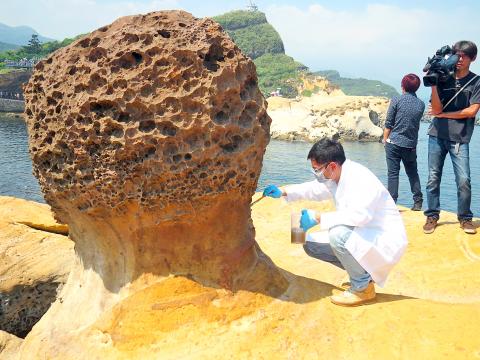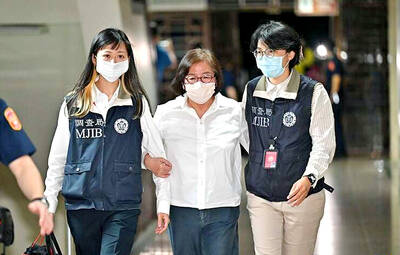The North Coast and Guanyinshan National Scenic Area Administration yesterday said that it would continue its search for the best way to preserve the iconic “Queen’s Head” (女王頭) rock formation at Yehliu Geopark (野柳公園) in New Taipei City, despite failed experiments on similar so-called “mushroom rocks” or hoodoos.
The fate of the formation hangs in the balance, as the circumference of the rock’s “neck” has diminished drastically due to erosion and human-inflicted damage.
Administration data showed that the neck shrank from 144cm in 2006 to 126cm this year.

Photo: Yu Chao-fu, Taipei Times
The neck could break in five to 10 years if an effective solution to reinforce it is not found soon, the administration said.
The administration said that in 2011 it entrusted a research team led by National Taiwan University professor Hsieh Kuo-huang (謝國煌) with the task of testing whether nanotechnology could reinforce the rock formation.
Laboratory results showed that the technology could strengthen weak rock to a medium-hard durability.
Meanwhile, the administration said that a survey conducted last year by Shih Hsin University’s polling center showed that more than 60 percent of respondents supported the use of nanotechnology to reinforce the Queen’s Head and prevent its collapse.
Due to the survey results, the administration allowed the research team to begin conducting an experiment at the site in August last year. Researchers applied a synthetic paste to other hoodoos near the Queen’s Head to see whether it would help them withstand erosion in a natural environment.
The administration said that the research team first tested four methods, but thermal expansion and contraction of the rocks led to the treatment exfoliating 20 days after the test began.
The research team then decided to use a waterproof paint in six different experiments, but holes began to appear on the painted surface about five months after the tests started, because the reinforcement layer was too thin, the administration said.
Humidity and rain also led to bleaching of the surface of some of the rocks, the administration added.
“[The rocks] were unable to overcome nature in the outdoor experiments over the past nine months,” the administration said.
Administration Director Chen Mei-hsiu (陳美秀) and Yehliu Geopark Manager Yang Ching-chien (楊景謙) reiterated that they would allow the research team to work on the Queen’s Head only if it can guarantee success in reinforcing the structure of the rock without changing its appearance, color and natural elegance.
Some have expressed concern that tourists might not want to visit Yehliu Geopark if the rock’s “neck “breaks off. However, a survey conducted by the administration found that 75 percent of respondents would still visit the park, even if the Queen’s Head were to collapse.

Costa Rica sent a group of intelligence officials to Taiwan for a short-term training program, the first time the Central American country has done so since the countries ended official diplomatic relations in 2007, a Costa Rican media outlet reported last week. Five officials from the Costa Rican Directorate of Intelligence and Security last month spent 23 days in Taipei undergoing a series of training sessions focused on national security, La Nacion reported on Friday, quoting unnamed sources. The Costa Rican government has not confirmed the report. The Chinese embassy in Costa Rica protested the news, saying in a statement issued the same

Taiwan is to extend its visa-waiver program for Philippine passport holders for another year, starting on Aug. 1, Minister of Foreign Affairs Lin Chia-lung (林佳龍) said on Friday. Lin made the announcement during a reception in Taipei marking the 127th anniversary of Philippine independence and the 50th anniversary of the establishment of the Manila Economic and Cultural Office (MECO) in Taiwan, the Ministry of Foreign Affairs said. The decision reflected Taiwan’s commitment to deepening exchanges with the Philippines, the statement cited Lin as saying, adding that it was a key partner under the New Southbound Policy launched in 2016. Lin also expressed hope

Temperatures in New Taipei City’s Sindian District (新店) climbed past 37°C yesterday, as the Central Weather Administration (CWA) issued heat alerts for 16 municipalities, warning the public of intense heat expected across Taiwan. The hottest location in Taiwan was in Sindian, where the mercury reached 37.5°C at about 2pm, according to CWA data. Taipei’s Shilin District (士林) recorded a temperature of 37.4°C at noon, Taitung County’s Jinfeng Township (金峰) at 12:50 pm logged a temperature of 37.4°C and Miaoli County’s Toufen Township (頭份) reached 36.7°C at 11:40am, the CWA said. The weather agency yesterday issued a yellow level information notice for Taipei, New

CASE: Prosecutors have requested heavy sentences, citing a lack of remorse and the defendants’ role in ‘undermining the country’s democratic foundations’ Five people affiliated with the Chinese Nationalist Party (KMT), including senior staff from the party’s Taipei branch, were indicted yesterday for allegedly forging thousands of signatures to recall two Democratic Progressive Party (DPP) lawmakers. Those indicted include KMT Taipei chapter director Huang Lu Chin-ru (黃呂錦茹), secretary-general Chu Wen-ching (初文卿) and secretary Yao Fu-wen (姚富文), the Taipei District Prosecutors’ Office said in a news release. Prosecutors said the three were responsible for fabricating 5,211 signature forms — 2,537 related to the recall of DPP Legislator Wu Pei-yi (吳沛憶) and 2,674 for DPP Legislator Rosalia Wu (吳思瑤) — with forged entries accounting for